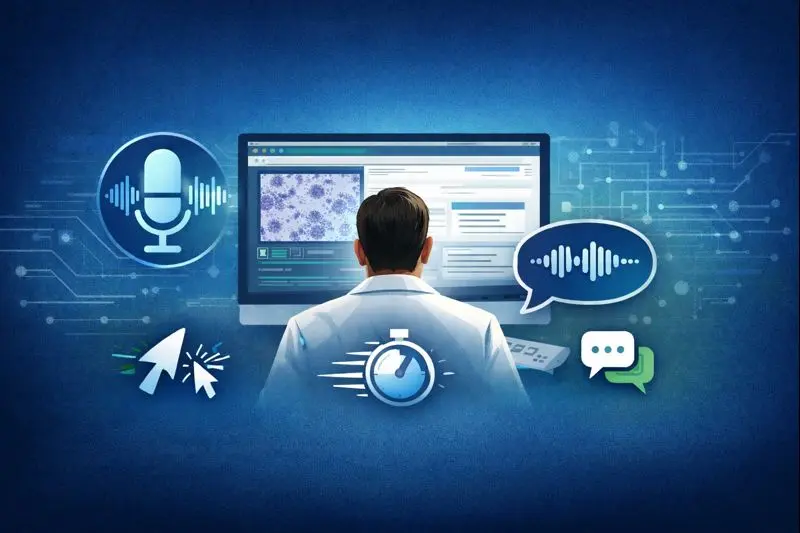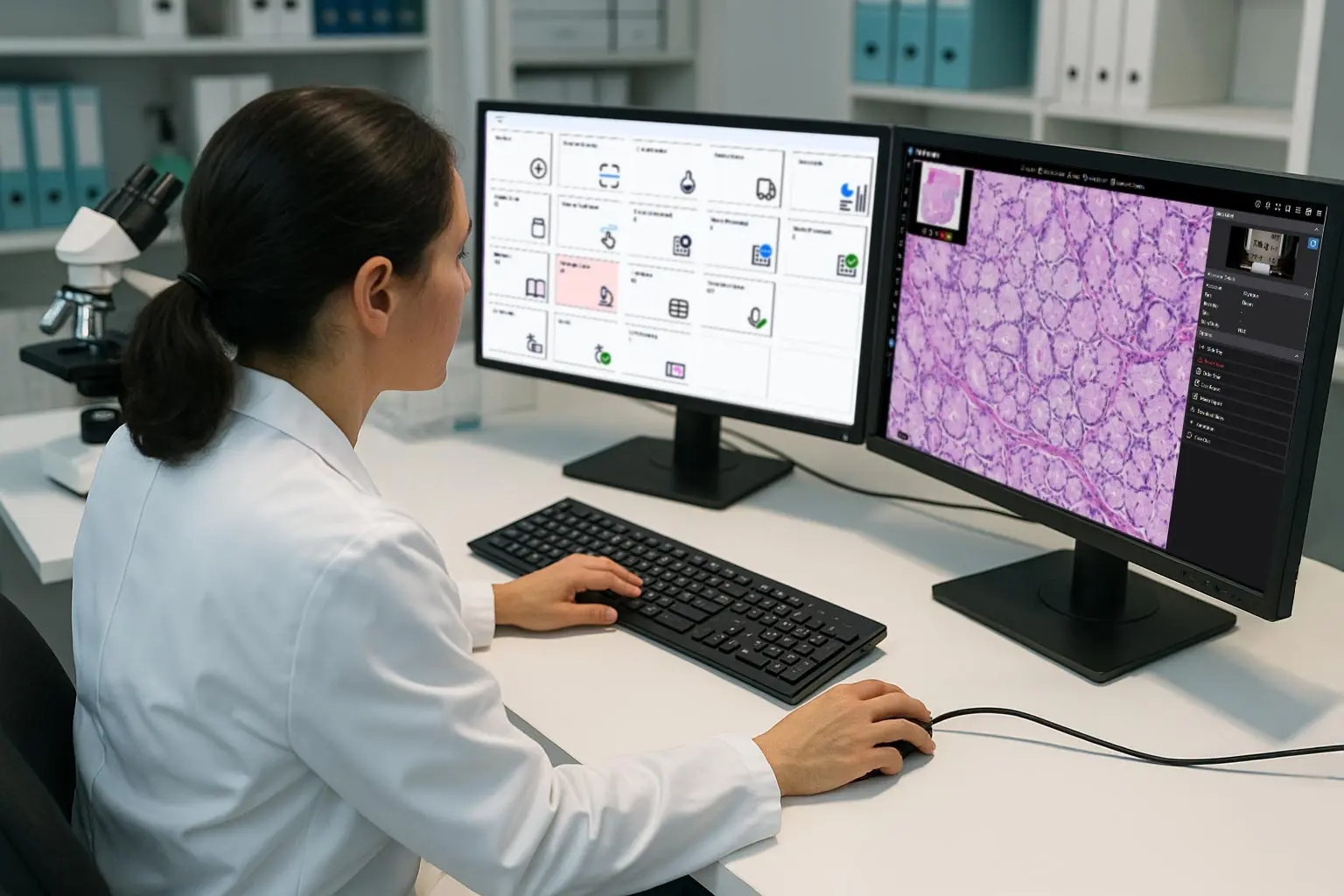Blog
What is Practice Management Software, Anyway?
January 17, 2026
In the ever-changing and complex world of healthcare, discerning the subtle nuances between the different types of software for medical laboratory solutions on the market can be overwhelming. With so many laboratory software systems and lab vendors available, navigating the path to purchase can make even the most sophisticated software aficionados tremble. But don’t stress; we’re here to break down what you need to know in an easy-to-digest, bite-sized way.
First, knowing exactly what medical laboratory solutions your healthcare organization needs is important. Two of the most popular types of pathology and clinical laboratory management software used in healthcare settings are the laboratory information system (LIS) and the practice management system (lab organization software). The LIS system is the platform of choice for molecular, clinical, and anatomic pathology laboratories, and practice management software is designed to help medical offices of any size run more efficiently.
Discover More: The Ultimate Guide to Choosing the Best Pathology Software for Your Lab
How Practice Management Software Benefits the Healthcare Community
For medical clinics and offices, practice management tasks can seem never-ending. On any given day, the list includes the administration of daily operations, business planning, records management, client communications, hiring and managing staff, ordering and managing equipment and consumables, ensuring regulatory compliance, invoicing, and appointment and calendar management.
Medical practice management software helps clinics and offices deal with all these aspects easily and efficiently by bridging the gap between clinical work and administrative tasks. Tasks like scheduling patient appointments, verifying insurance, and managing laboratory revenue cycle management (the RCM cycle) are distinct from clinical roles that provide healthcare services.
Although practice management software generally includes features that involve patient information, the lab organization software is primarily designed to help medical clinics and offices manage administrative workflows, not clinical ones. For instance, a software system used by mental health practitioners can be integrated with practice management systems to streamline both administrative and clinical tasks efficiently.
Some offices even use practice management software to connect with electronic health records (EHRs), a completely different type of medical software. That’s why it’s important to note that medical practice management software is less about patient documentation or medical history and more about running the office.
Discover More: Four Game-Changing Business Strategies to Improve Laboratory Processes

What is the Purpose of Practice Management Software?
Practice management software can capture patient demographics, but usually doesn’t include a patient’s medical history. It is specifically designed for healthcare practices to streamline and automate the common tasks that can’t be easily managed with manual tasks.
Although small, low-volume clinics and offices can survive using manual, paper-based systems, most find that practice management software makes things run much more smoothly. Instead of having separate systems or ledgers for client contact records, treatment notes, appointment calendars, client referrals, and invoicing, practice management software enables all of this information to be in one integrated place.
Many practice management platforms even include reporting functionality that helps clinics and offices to understand what’s happening within the organization in real time.
The American Medical Association states that the goal of healthcare practice management is to enhance efficiency, professional satisfaction, and the delivery of patient care. In support of this, practice management software can help in several ways.
For example, with practice management software, front desk staff will no longer have to make copies of patients’ insurance cards. Instead, they can simply scan the cards with the software, capturing all the necessary fields.
Get Insight: Is Your Laboratory Information System Able to Support the Latest LIS System Technology?
More Practice Management Software Examples
Physicians can also use practice management software to validate a procedure with an insurance company before ordering it. This also helps patients who need clarification about their insurance coverage or Explanation of Benefits (EOB).
Practice management software even reduces paperwork, allowing the laboratory billing department to search through patient records and digital reports covering insurance information, remittances, and claim advice. Because practice management software maintains documents and data online, it streamlines operations within a practice, including the ability to search EHR documents.
Case Study: Clinical and Pathology Lab Management Guide - Find Out How Experts Utilize Best Practices to Thrive

What is an LIS Laboratory Information System Software?
Molecular, clinical, and anatomic pathology labs are critical players within the overall healthcare delivery ecosystem. That’s why it’s important to understand the importance of the LIS system in healthcare, and how a modern medical LIS software differs from practice management software.
Simply stated, a LIS medical solution is a laboratory software system that helps clinical labs and pathology practices manage many operational aspects of laboratory workflow management, including inputting, processing, and storing the information and data of a lab.
These specialized clinical and pathology LIS systems act as data warehouses for all cases and include reporting, image acquisition, direct digital interface with microscopes, label printing, electronic sign-out, quality control, integration with prior test results, auto-reflexing, and more.
The LIS system has become a common part of the data infrastructure of advanced healthcare systems, busy laboratories, and hospitals, and the best laboratory information system software even supports in-house laboratory billing (lab RCM).
Discover More: Reduce Denials and Stop Revenue Leakage With Integrated Laboratory Billing Management
Inside labs, LIS software manages the data flow of information, including various lab processes, such as recording, updating, and storing patient-related data, sample tracking management, and reports management.
LigoLab’s all-in-one LIS & RCM Informatics Platform is a great example of today’s best-in-class clinical and pathology software solutions. The enterprise-grade lab information system includes dynamic modules for anatomic pathology, clinical laboratory, molecular diagnostics, lab billing, and direct-to-consumer lab testing (TestDirectly), all integrated on a single informatics platform that is highly configurable and supports every role (administrative, operational, financial), within the medical laboratory.
Discover More: The Power of Integration - Unleashing the Potential of LigoLab's LIS System & Lab RCM Platform

What Can LigoLab’s Platform Do for Your Lab?
LigoLab’s platform ensures full interoperability with instruments, electronic health records (EHRs), and third-party services adopted by laboratories. Other salient features of the all-in-one LIS system and lab RCM platform include powerful specimen barcoding and tracking support, a robust and searchable audit trail, compliance verification at every stage, a built-in interface engine, flexible engines for rules and automation, fully customizable reports, and multiple distribution options.
This comprehensive bundle of features comes with a user-friendly interface and unlimited customization capability to cater to the unique needs of various customers, no matter the size of their laboratory operations or the type of testing under their practice.
According to Frost & Sullivan analyst Amartya Bose, “LigoLab’s truly integrated LIS & RCM platform allows for the seamless integration, transparency, and situational awareness of all laboratory operations and RCM processes through its real-time, queue-facilitated workflow. This RCM module ensures billing cycle management starts at the order initiation, providing a single source of truth supported by automated coding and regulatory claim compliance verification, thus reducing the risk of denials at a later stage by up to 98 percent and improving the net collections for laboratories.”
The LigoLab Platform is designed for use at general or specialized pathology practices, large and small, and integration with hospital management systems. The platform also delivers maximum interoperability to all instruments, devices, EHRs, and third-party services.
Discover More: LigoLab Delivers the LIS System Interoperability Needed to Transform Medical Laboratories into Thriving Businesses
LigoLab’s LIS system platform with embedded laboratory billing solutions is under constant development in an ongoing effort to support every laboratory role. As such is the case, it’s not out of the realm of possibilities for the platform to soon incorporate all practice management functionality within the LIS system. That’s the direction LigoLab is headed, and the LIS company and its partner labs are constantly looking for ways to become even more efficient and productive.
Get Insight: Navigating the Future of Pathology - The LigoLab Advantage

Please Tell Me More About LigoLab!
LigoLab is an award-winning provider of innovative end-to-end healthcare LIS software for clinical and pathology laboratories, serving hundreds of facilities nationwide.
As a comprehensive, enterprise-grade clinical and pathology lab management system, the LigoLab platform empowers laboratories to deliver better patient care, differentiate in competitive markets, scale operations with confidence, and strengthen compliance and profitability.
Ready to see how it works in practice?
Connect with a LigoLab product specialist to explore how the platform can support your lab’s goals.
Act Now: Speak with a LigoLab Product Specialist!






